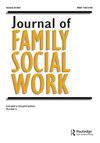父母自我效能感、父母教养质量与亲子情绪健康的关系分析。
IF 0.7
Q3 SOCIAL WORK
Journal of Family Social Work
Pub Date : 2019-01-01
Epub Date: 2019-06-28
DOI:10.1080/10522158.2019.1635939
引用次数: 5
摘要
本文章由计算机程序翻译,如有差异,请以英文原文为准。
An analysis of the relationship between parenting self-efficacy, the quality of parenting, and parental and child emotional health.
ABSTRACT The relationship between parenting self-efficacy, the quality of parenting, and parental and child emotional health has been conducted with Caucasian families and young children. The purpose of this study was to examine these relationships in ethnically diverse and impoverished families with children who have behavior problems. We examined the relationships between parenting self-efficacy, parenting practices, child externalizing problems, and caregiver depression. Participants included 213 caregivers of children with Oppositional Defiant Disorder (ODD), who rated their parenting self-efficacy and completed questionnaires on parenting practices (APQ and FAD); child externalizing behaviors (Iowa Connors Inattention and ODD subscales); and caregiver depression (CESD). Data were examined using Chi-Square tests, a Linear Regression, and a One-Way ANOVA. Results demonstrate parenting self-efficacy was positively associated with positive parenting and inversely associated with inconsistent discipline. Among parents who perceived themselves as being a “better than average parent,” there was a greater percentage of youth who met cutoff for inattention problems as compared to youth who did not meet this cutoff. Lastly, depression scores were lowest for caregivers identifying as below average parents. This study underscores the need for involving parents and enhancing parenting self-efficacy in interventions targeting Disruptive Behavior Disorders.
求助全文
通过发布文献求助,成功后即可免费获取论文全文。
去求助
来源期刊

Journal of Family Social Work
SOCIAL WORK-
CiteScore
2.10
自引率
0.00%
发文量
4
期刊介绍:
Each issue of the Journal of Family Social Work contains peer reviewed research articles, conceptual and practice articles, creative works, letters to the editor, and book reviews devoted to innovative family theory and practice subjects. In celebrating social workers" tradition of working with couples and families in their life context, the Journal of Family Social Work features articles which advance the capacity of practitioners to integrate research, theory building, and practice wisdom into their services to families. It is a journal of policy, clinical practice, and research directed to the needs of social workers working with couples and families.
 求助内容:
求助内容: 应助结果提醒方式:
应助结果提醒方式:


